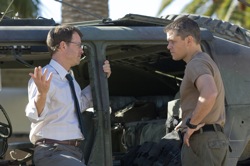
After making the final two thirds of the outstanding international thriller/action Bourne franchise together, director Paul Greengrass and actor Matt Damon have teamed up again for Green Zone. Set in the early days of the 2003 Iraq War, Damon plays US Army Chief Warrant Officer Roy Miller who is deployed in Baghdad to find the Weapons of Mass Destruction that the allies gave as their reason to invade Iraq. After repeatedly coming up empty-handed Miller starts to question the reliability of the military intelligence his team is being fed. What unfolds plays out like a conspiracy thriller where the audience already know what Miller does not – there are no WMDs in Iraq but there are many powerful interests invested in the belief that there are.

Of all the previous films made about the 2003 Iraq War, Green Zone has the most in common with Nick Broomfield’s Battle for Haditha (2007). Both films use handheld cameras to create a cinéma vérité style of cinematography that makes what is on-screen appear to be raw footage filmed by a cameraperson who was on the ground and amid the action. Both films are also critical of the American involvement in Iraq, however, Green Zone doesn’t demonise all the Americans and instead champions righteous characters such as Miller and CIA man Martin Brown (Brendan Glesson) who come up against self-serving characters such as Defence Intelligence agent Clark Poundstone (Greg Kinnear).
Likewise, the Iraqi characters are not just viewed as the enemy or as victims and the character of Freddy (Khalid Abdalla from The Kite Runner) is used very effectively to represent the everyday people of Baghdad who want an end to the violence and oppression in their country. None of the characters in Green Zone are particularly complex in their own right but together they represent a broad range of view-points that situates Green Zone neatly between Brian De Palma’s overly didactic Redacted (2007) and Kathryn Bigelow’s apolitical The Hurt Locker (2008).
 However, the main appeal of Green Zone is Greengrass’s approach to filming action, which he developed covering global conflicts for television. Instead of blocking the action for the camera frame, Greengrass allows the action to unfold while the camera must simply keep up. The result is a camera that is constantly moving, which increases during the really adrenin-pumping scenes to reach an exhilarating crescendo in the film’s climatic gunfight/chase sequence. Unlike the rapid editing of composed shots in the films of directors such as Michael Bay, with Greengrass you never feel as if you are missing any of the important details about what is going on within all the chaos on screen.
However, the main appeal of Green Zone is Greengrass’s approach to filming action, which he developed covering global conflicts for television. Instead of blocking the action for the camera frame, Greengrass allows the action to unfold while the camera must simply keep up. The result is a camera that is constantly moving, which increases during the really adrenin-pumping scenes to reach an exhilarating crescendo in the film’s climatic gunfight/chase sequence. Unlike the rapid editing of composed shots in the films of directors such as Michael Bay, with Greengrass you never feel as if you are missing any of the important details about what is going on within all the chaos on screen.
Green Zone continues Greengrass and Damon’s collaboration on making action films for the ‘thinking person’. This time they are also using the action genre to set the record straight by reminding audiences that despite the rhetoric that has since come out, the rationale behind invading Iraq was based on highly dubious information that Iraq was stockpiling WMDs.
![]()

Sounds like an Iraq film that won’t win any Oscars, in other words. Too damn political. Sounds great, can’t wait.
I found it hard to keep from thinking that Greengrass and Damon would spend so much money on a great thriller with such passion to set the record straight, at least that was the feeling I got from it. I still think it will do well over time as far as getting a return on their dime spent. I am fearful of how americans will vilify their much loved Matt for his political burn in this film. Bourn made Damon a sophisticated JB, and the moviegoers fell in love with him. So how did he feel about his role in The Good Shepard? I think politics in film are hard on the public these days. Avatar had some hits on the President yet was so much entertainment that people let it go.
Hi Randolf
I think so-called left wing politics or liberal politics are hard for many people to swallow these days when those viewpoints are thought to be expressed on screen. Films with deeply conservative messages, representations and opinions don’t get nearly the same mainstream scrutiny as films like Avatar. I find that conservatism and even neo-conservatism tends to be regarded as the norm these days.
Cheers
Thomas
Right on review. Also, the film added a new layer to the “inconvenient inaccuracies” of the intelligence community’s WMD reports – that fateful meeting in Jordan. Lying about WMDs is one thing but if that meeting actually occurred… smh. Great flick and kudos to Damon and Greengrass for exploring some truly disturbing questions.